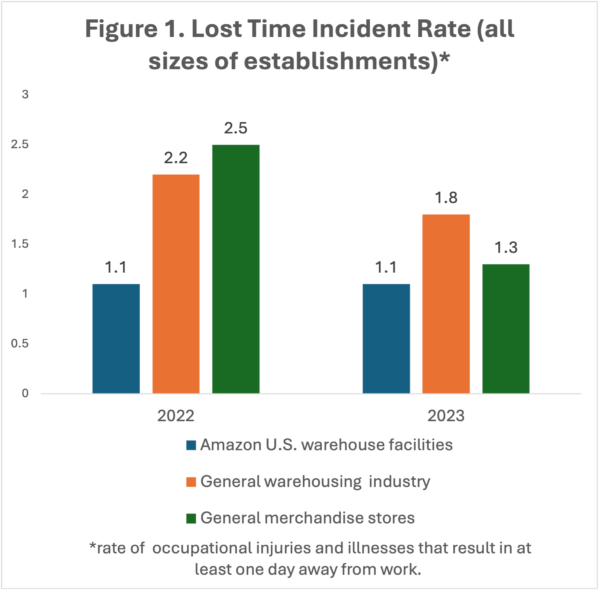There is nothing wrong with politicians paying attention to worker safety. Monitoring worker safety is an important role of government, both historically and today.
But Senator Bernie Sanders’ latest report attacking Amazon’s safety record sheds more heat than light on the subject. The report is based on the premise that the company operates “uniquely dangerous warehouses.”
However, a careful look at government data tells a different story. In particular, we look at the rate of job-related injuries and illnesses that result in at least one day away from work (“lost time incident rate” or LTIR). These are the more serious safety incidents, measured relative to 100 full-time equivalent workers.
In both 2022 and 2023, the average LTIR at Amazon’s U.S. warehouse facilities was only 1.1, significantly below the general warehousing industry as a whole, including all sizes of establishments (see figure below).
Perhaps more important, Amazon’s U.S. warehouse facility LTIR was less than the average LTIR for the vast array of general merchandise stores across the country, including department stores and supercenters, and their associated e-commerce fulfillment facilities. The general merchandise store industry employs more than 3 million workers, suggesting that Amazon’s safety record stacks up well in a broader context.
The Sanders report was released as the International Brotherhood of Teamsters is leading protests against a small number of Amazon facilities nationally. Once again, it’s not unreasonable for workers to press for better working conditions and higher wages. But it must be noted that Amazon and other e-commerce companies would be better characterized as pay leaders rather than pay laggards. According to BLS data, real pay growth over the past five years for production and nonsupervisory workers in e-commerce industries, such as general warehousing (6.2%) and couriers and messengers (5.1%), significantly outperformed the national average for all private sector industries (4.0%). In particular, real pay growth in ecommerce industries has outstripped major industries such as manufacturing, construction, and general merchandise retailers, where real pay has actually fallen since 2019 (see table below).
After the November election, progressives must focus their attention on issues that are important to working-class Americans. Job safety and wage growth are clearly relevant. But combining these key topics with distorted attacks on large tech companies is not the way to win the hearts and minds of voters.

| Table 1. 5-Year Real Pay Growth, Selected Industries | |
| Real hourly pay, production and nonsupervisory workers, percentage change, October 2019-October 2024 | |
| General warehousing* | 6.2% |
| Health care | 5.1% |
| Couriers and messengers* | 5.1% |
| Private sector | 4.0% |
| Manufacturing | 2.6% |
| Construction | 2.5% |
| General merchandise retailers | -2.9% |
| *E-commerce industries | |
| Data: BLS | |